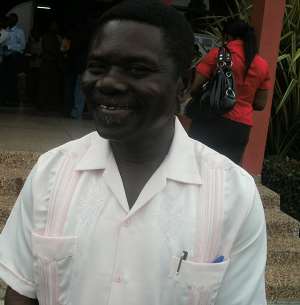
Ghana's Best Scientist for 2011 is drawing the country's attention to the need to come up with strategies to harvest and conserve water both plant and human fortification.
With climate change staring in the face of global economies, Dr. Hans Adu-Dapaah has stated that the practice of rain-fed agriculture in Ghana should not continue, because the rains are no longer predictable.
He says there should rather be a conscious national drive to encourage households to harvest water, whilst farmers are supported with small scale irrigation facilities to enhance food production.
“Infact, I can consecutively say that about two percent of our land area is under irrigation, which is woefully inadequate but it looks like the government is making efforts and I think the private sector should also augment the attempts by government because government cannot do it alone. That's where we need partnership between the private sector and the government to be able to come up with small-scale irrigation facilities that can be used by farmers”, Dr. Adu-Dapaah observed in an exclusive interview with Luv Biz Report.
Water is predicated to be one of the scarce commodities in the world within the next 30-50 years and it was among topical issues at the first Ghana Science Congress, which was recently held in Accra.
Dr. Adu-Dapaah noted that as researchers come up with drought-tolerant plants, it is most critical for farmers to access water to get the best yield from crop varieties.
The Director of the Crops Research Institute (CRI) of the Council for Scientific and Industrial Research (CSIR) received the Presidential Best Scientist award for his work in the development of crop varieties and training of middle-level agricultural officers.
He has developed a number of technologies which have improved the livelihoods of resource-poor farmers. These include the release of four virus-resistant groundnut varieties, two high yielding cowpea varieties with high calcium content and two high yielding soybean varieties.
The Chief Research Scientist and Plant Breeder has contributed to capacity building, supervising projects of over 50 PhD, MPhil, Master and Undergraduate students from public universities in Ghana and abroad.
He also mentors young scientists, two of whom also emerged winners of the gold and silver awards in the Young Scientist category of the awards scheme, instituted by the Ministry of Environment, Science and Technology.
Dr. Adu-Dapaah believes Ghana is getting it right in the training of the youth to venture agriculture, but observed “they need to be convinced that going into farming is a business and you can be well off, you can be better off like any other profession. Hitherto, farming had been taken as a hobby but now we're teaching the up and coming young ones that you want to do farming, you need to locate your market, you need to do a business plan, so that before you even go into cultivating whatever crop you're into or animal species you're into, you should have done some analysis to find out whether you're going to make profit or not”.
He also emphasized the need to make improved seeds easily accessible to farmers “because most of the seed companies are dotted around the regional capitals. We need to work on it; how to be able to get the seeds and the technologies to the farmers in the rural areas so that productivity will improve”.
Dr. Adu-Dapaah was awarded with a Toyota Corolla Car, donated by rLG Communication, Gh¢20,000 cash among other packages.
He plans to invest part of his cash reward into research and give technicians at the CRI-CSIR as a form of motivation.
Kofi Adu Domfeh/Luv Fm/Ghana




 Supreme court declares payment of wages to spouses of President, Vice President ...
Supreme court declares payment of wages to spouses of President, Vice President ...
 Publish full KPMG report on SML-GRA contract – Bright Simons to Akufo-Addo
Publish full KPMG report on SML-GRA contract – Bright Simons to Akufo-Addo
 Kumasi International Airport to begin full operations by end of June
Kumasi International Airport to begin full operations by end of June
 Election 2024: Our ‘real challenge’ is getting ‘un-bothered’ youth to vote – Abu...
Election 2024: Our ‘real challenge’ is getting ‘un-bothered’ youth to vote – Abu...
 [Full text] Findings and recommendations by KPMG on SML-GRA contract
[Full text] Findings and recommendations by KPMG on SML-GRA contract
 Renegotiate SML contract – Akufo-Addo to GRA, Finance Ministry
Renegotiate SML contract – Akufo-Addo to GRA, Finance Ministry
 J.B Danquah-Adu murder trial: Sexy Dondon to Subpoena Ken Agyapong, Ursula Owusu
J.B Danquah-Adu murder trial: Sexy Dondon to Subpoena Ken Agyapong, Ursula Owusu
 Galamsey: Five Burkinabes jailed 20 years each for mining
Galamsey: Five Burkinabes jailed 20 years each for mining
 'It's no crime' – Abu Sakara defends Alan's exit from NPP
'It's no crime' – Abu Sakara defends Alan's exit from NPP
 'We know all your houses, pay your bills now or we’ll disconnect you; we're all ...
'We know all your houses, pay your bills now or we’ll disconnect you; we're all ...
